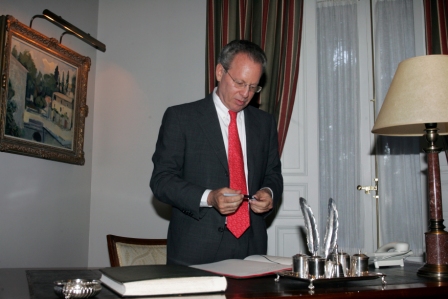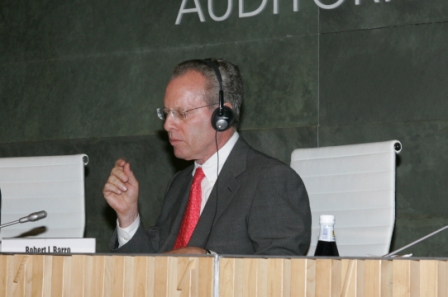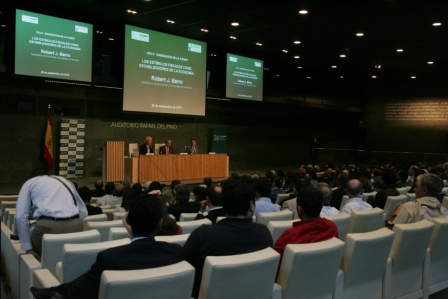The Rafael del Pino Foundation hosted the lecture by Robert J. Barro entitled "Fiscal stimuli as stabilisers of the economy", as part of the series of Master Lectures "Lessons from the crisis", on 29 September 2010.
Robert J. Barro stated that "I have made calculations of the so-called expenditure multiplier, i.e. the response of GDP to changes in government spending policy on goods and services. I have used time series data for the US economy. And I have found that there is indeed a positive effect of increased government spending on GDP. But this effect is marginal, which is very important in this context. If we apply this conclusion to the 2009-2010 fiscal stimulus package in the US, we can quantify the impact on GDP in 2009 as an increase of one percentage point and less than half a percentage point in 2010. This is a very small effect and, what is worse, public indebtedness has increased due to the increase in spending, which means that, in the long run, the overall effect will be negative as tax increases will be needed to pay for this increase in debt. If we consider all these elements simultaneously, we see that this small positive effect on economic growth in 2009-2010 will be offset, in the future, by the problems derived from the increase in public debt and the foreseeable increase in taxes to finance it. I believe that, given the current fiscal deficit situation in the US, the effort should have been directed towards tax cuts and not towards increased public spending. On the fiscal side, rather than tax rebates to taxpayers, the fiscal stimulus package should have concentrated on cutting marginal tax rates".
Regarding the effectiveness of global poverty reduction programmes, Robert J. Barro argued that "global poverty reduction over the last twenty to thirty years has not been achieved through economic aid programmes for the poorest countries. These programmes are counterproductive in boosting economic growth. The greatest achievements since the 1980s have been reflected in the experiences of China and India, whose economic growth rates have been very high, unthinkable in previous years, and have lifted millions of people out of poverty. These two countries have been the determining factor in reducing global poverty rates. However, the biggest failure of poverty reduction efforts has been seen in Sub-Saharan Africa. We are talking about countries that have been major recipients of aid programmes that have failed to achieve their objectives. I do not believe that international aid is a determining factor in the fight against poverty in the world. If, as a consequence of the crisis, there is a reduction in these programmes, I think there will be a positive impact on the fight against poverty at the global level.
Robert J. Barro gave his lecture as part of the "Lessons of the Crisis" series. The Rafael del Pino Foundation is holding this series of conferences, which was opened by Enrique V. Iglesias and in which Michel Camdessus, David C. Schmittlein, Richard M. Locke, Finn E. Kydland, Stefan Ingves, Julio María Sanguinetti, Andreu Mas-Colell, Juergen B. Donges, Makoto Utsumi, Dani Rodrik and Luis Garicano have also participated. Donges, Makoto Utsumi, Dani Rodrik and Luis Garicano. Robert E. Lucas and Moisés Naím will speak.







